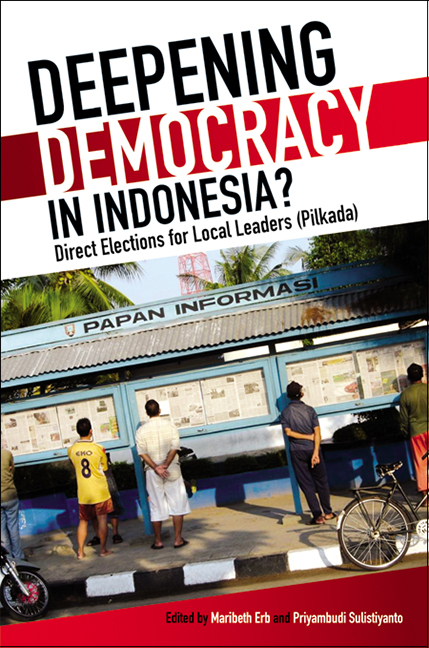Book contents
- Frontmatter
- Dedication
- Contents
- List of Tables
- List of Figures
- Contributors
- Acknowledgements
- Glossary
- 1 Indonesia and the Quest for “Democracy”
- 2 Pilkada Langsung: The First Step on the Long Road to a Dualistic Provincial and District Government
- Part I Political Parties, Politician Elites and the Voters
- 3 Political Parties in Pilkada: Some Problems for Democratic Consolidation
- 4 Batam's 2006 Mayoral Election: Weakened Political Parties and Intensified Power Struggle in Local Indonesia
- 5 The Rising Importance of Personal Networks in Indonesian Local Politics: An Analysis of District Government Head Elections in South Sulawesi in 2005
- 6 Pilkada, Money Politics and the Dangers of “Informal Governance” Practices
- 7 Electing District Heads in Indonesia: Democratic Deepening or Elite Entrenchment?
- 8 Gender and Reform in Indonesian Politics: The Case of a Javanese Woman Bupati
- 9 Pilkada in Bantul District: Incumbent, Populism and the Decline of Royal Power
- Part II Media and Campaigns: Comparing Local and National Elections
- Part III Conflict, Ethnicity, and Political Divisions
- Index
6 - Pilkada, Money Politics and the Dangers of “Informal Governance” Practices
from Part I - Political Parties, Politician Elites and the Voters
Published online by Cambridge University Press: 21 October 2015
- Frontmatter
- Dedication
- Contents
- List of Tables
- List of Figures
- Contributors
- Acknowledgements
- Glossary
- 1 Indonesia and the Quest for “Democracy”
- 2 Pilkada Langsung: The First Step on the Long Road to a Dualistic Provincial and District Government
- Part I Political Parties, Politician Elites and the Voters
- 3 Political Parties in Pilkada: Some Problems for Democratic Consolidation
- 4 Batam's 2006 Mayoral Election: Weakened Political Parties and Intensified Power Struggle in Local Indonesia
- 5 The Rising Importance of Personal Networks in Indonesian Local Politics: An Analysis of District Government Head Elections in South Sulawesi in 2005
- 6 Pilkada, Money Politics and the Dangers of “Informal Governance” Practices
- 7 Electing District Heads in Indonesia: Democratic Deepening or Elite Entrenchment?
- 8 Gender and Reform in Indonesian Politics: The Case of a Javanese Woman Bupati
- 9 Pilkada in Bantul District: Incumbent, Populism and the Decline of Royal Power
- Part II Media and Campaigns: Comparing Local and National Elections
- Part III Conflict, Ethnicity, and Political Divisions
- Index
Summary
INTRODUCTION
Since mid-2002 (approximately one year after the implementation of Law No. 22/1999), discussions on decentralization and regional autonomy policies in Indonesia began to focus on the realities of so-called otonomi kebablasan (over-exaggerated autonomy) vs. otonomi setengah hati (halfhearted autonomy). Polemics on this issue started to penetrate upwards in early 2003, due to the agreement of various involved parties on the necessity to revise Law No. 22/1999, agreed to be the most effective remedy to end the practices of over-exaggerated and half-hearted regional autonomy. By 2004 the debate on the urgency of revising Law No. 22 faded somewhat from public discourse because of the interest stirred by the direct presidential election. Then, in October 2004, after the election of Susilo Bambang Yudhoyono and Jusuf Kalla as president and vice president, the government together with the DPR (National Assembly) decreed Law No. 32/2004 to replace Law No. 22/1999.
Substantially, one of the important changes instigated by Law No. 32/2004 is the implementation of the so-called sistem pilkada langsung (a direct election system for local government heads). In following up the performance of this constitutional mandate, the central government decided to carry out the direct elections immediately, starting in mid-2005. This decision has been valued by many observers as a “big step”, and a fundamental reform, towards a more democratic local government in Indonesia. However, it is also possible to conceive of a number of factors which could, directly or indirectly, threaten the attainment of that expectation. Amongst other things are the dangers of so-called “money politics” (during the pilkada process), and “informal governance” practices in the post-pilkada period.
Theoretically, it has been contended that the implementation of a direct election system for local government heads would bring a number of promises to the establishment of a democratic local government, or what many scholars have currently labelled as “local good governance” (Arghiros 2001; Smith 1985). Decentralization policy, it is believed, pushes the central government to disperse its power and authority to local governments. Meanwhile, directly electing local government heads allows the attainment of an accountable local government, as a corollary, thus leading local governments to be more responsive to the demands of their communities.
- Type
- Chapter
- Information
- Deepening Democracy in Indonesia?Direct Elections for Local Leaders (Pilkada), pp. 125 - 146Publisher: ISEAS–Yusof Ishak InstitutePrint publication year: 2009

